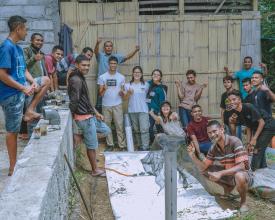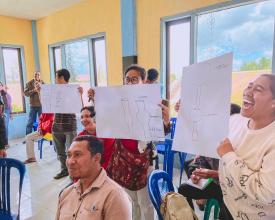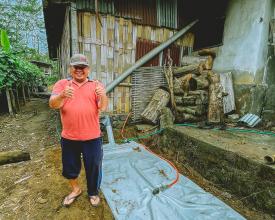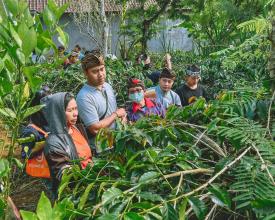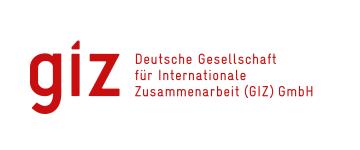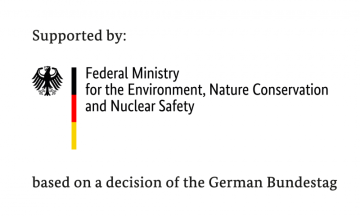
Biogas Initiative for Agriculture in Indonesia funded by carbon offset
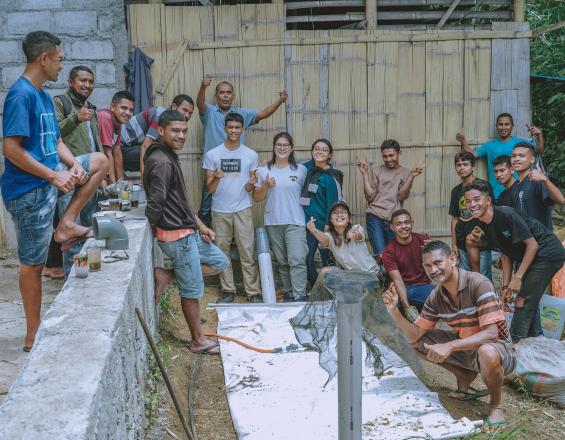
Farmers in rural Indonesia are vulnerable to climate change and lack access to clean renewable energy. Meanwhile, Indonesia has to accelerate renewable energy uptake to achieve its national NDCs.
The biogas initiative project was conducted to address said issues through three outputs. 1) Installing biogas digesters to help farmers reduce their dependence on fossil fuels, improve waste management practices, and lower GHG emissions. 2) Conducting Climate Field Schools to educate farmers to adopt climate-smart agriculture and increase their resilience to climate shocks. 3) Conducting a feasibility study seeks to create a viable business model for biogas dissemination through the carbon market.
The project has achieved its outcome of creating a sustainable management model for biogas digesters to scale up from 100 to 20,000 units per year in Indonesia.
Context
Challenges addressed
The solution has addressed several key issues:
Environmental: Greenhouse gas emissions and fossil fuel usage by promoting biogas digesters as a renewable energy source. Additionally, it addresses soil degradation and chemical pollution by producing organic fertilizer from biogas digesters.
Social: The solution addresses low awareness and capacity among farmers regarding biogas benefits and climate change adaptation by organizing climate field schools and providing information on livestock health and agricultural techniques. It also improves network and collaboration among farmers and stakeholders through a reliable communication and support platform.
Economic: The solution helps farmers reduce costs by utilizing biogas and organic fertilizer, addressing high fuel and fertilizer expenses. It also explores carbon financing and engages with the government and private sector to expand financing options for biogas dissemination, tapping into carbon market opportunities.
Location
Process
Summary of the process
The biogas installation, which is the main project component, was achieved by conducting the climate field schools. Overall, the CFS connected the project organization to more than 30 farmers interested in owning a digester. The CFS was also critical to have a holistic approach by educating farmers on both climate change mitigation and adaptation.
The two abovementioned building blocks were then fundamental for the policy dialogues. For the Meteorology Agency (BMKG), expanding the network for conducting CFS is part of the national adaptation targets, and the biogas digester is now part of their curriculum. For the Ministry of Energy and Mineral Resources (MEMR), the small-scale biogas case study in the project was an important narrative for their bioenergy targets.
Part of the Feasibility Study was stakeholder engagement. The project conducted the Indonesian Carbon Market Workshop by inviting various Governmental stakeholders who are involved. The workshop’s main aims are to educate the Indonesian Government on the importance of biogas co-benefits in carbon financing while also gaining insights about the national frameworks.
Building Blocks
Biogas Deployment
Installing small-scale biogas digesters to farmers.
Enabling factors
Important criteria to receive a digester include: owning pigs/cows, access to water, location with enough sunlight, and sufficient space nearby the kitchen.
Lesson learned
Champion farmers must first be identified a important pilot cases for each village. Once a champion farmer has successfully utilized the digester, the other farmers in the village will follow. This way, biogas digesters are installed village-by-village and not farmer-by-farmer.
It takes time for farmers to fully understand how the biogas digester work. Farmers are hands-on learners, which makes the CFS the perfect platform to promote the digesters.
Climate Field Schools
Informal training in the field about climate information, biogas usage, and creating adaptation plans for the upcoming seasons.
Enabling factors
Farmers were first identified through vulnerability assessments, where their areas are noted to be impacted by climate change (e.g. low crop production).
It is important to conduct CFS to close-knit communities, as such groups would motivate each individual to implement practices that are being taught.
Lesson learned
Different farmer groups require different approaches and educational curricula. Depending on what problems are in the field, the CFS module must be adjusted to their needs.
The same way the biogas digesters are promoted in the field schools, some farmer groups would have different highlights about the digester. For instance, some groups struggle more with getting fertilizers than gas. Biogas as a tool for fertilizers need to be highlighted in this case.
Policy Dialogues or Workshops
A dialogue or workshop with governmental stakeholders to present case studies or solutions that could be incorporated into national policies.
Enabling factors
An ongoing collaboration with the national government and close communication about various project updates that are beneficial for policy.
Lesson learned
Conducting panel discussions or FGD has been shown to facilitate dialogues between the public and private sectors. Such discussions are important for information accessibility to the private sector, while also influencing policies that are not resistant to project goals.
For instance, the carbon market workshop was significant in elaborating the Ministry of Environment and Forestry (MoEF) plan on the Indonesian Carbon Market. Elaborating projects such as the biogas initiative early on is necessary to ensure smooth implementation once the policies are ready.
Feasibility Study
A study on how the carbon market could potentially finance climate adaptation/mitigation projects.
Enabling factors
Collaboration with researchers in the climate financing field and relevant governmental stakeholders.
Lesson learned
The Indonesian carbon market is yet to be fully developed, with many uncertainties in the policy side. Nonetheless, feasibility study became a guideline for other initiatives who are searching for sustainable financing for their mitigation projects.
Although the findings were not fully conclusive, connections with the Government were established along the way to receive the necessary information for future implementation.
Impacts
The project has installed 42 biogas digesters that reduce greenhouse gas emissions from organic waste and fossil fuel use. The organic fertilizer by-product also improves soil health and reduces chemical fertilizer use. By using the digester, each unit is estimated to reduce 1 ton of CO2 equivalent per year. Moreover, each farmer can save up to $300 per year using biogas by reducing fertilizer and LPG purchases.
The Climate Field Schools have educated over 108 farmers about biogas benefits and climate change adaptation. The climate field schools also provide information on livestock health and agricultural techniques.
Lastly, while exploring carbon financing, the project has facilitated dialogues between the government and the private sector on the carbon market opportunities, which promoted other multi-benefit climate initiatives to explore financing schemes.
Beneficiaries
Coffee and Cacao Farmer Communities in Bali and Flores who receive the biogas digesters and attend the climate field schools
Local and National Government that attended the Policy Dialogue and the Carbon Market Workshop as Panelists
Sustainable Development Goals
Story
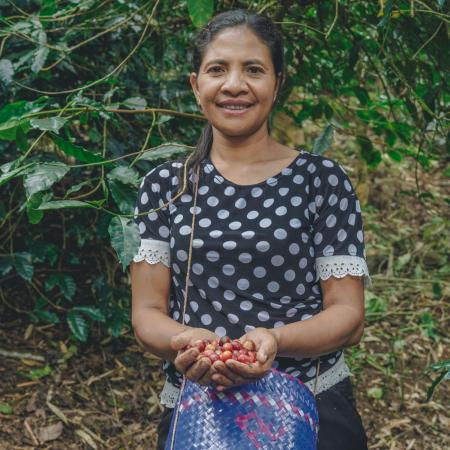
The project found that women’s roles were significant among farmers' groups or cooperatives. One cooperative stands out in the entire project, with most members being young women. Maria Goretti Kedhi, commonly known as Mama Reti, is one of the Fa Masa coffee cooperative leaders in Bajawa, Flores.
Mama Reti has always been concerned about energy sources' high cost and low reliability. One day, she joined the Climate Field School, which provided her with climate education and biogas installation. She was immediately interested in owning one digester. Not soon after the training, she installed the digester together with the team in her family's backyard. The biogas was fed with manure from her pigs, where she can use the gas for cooking and the fertilizer for her coffee farm.
In one of the interviews, Mama Reti gave an inspirational speech for young women. After understanding the climate situation, she believes that women play a significant role in advancing agriculture. She encourages young women to be farmers, by demystifying the belief that farming is dirty. In fact, biogas provides clean energy for the family.
Mama Reti's story is an example of how biogas can improve rural women's and their families' lives. Biogas is a simple, affordable solution that can provide clean and reliable energy while enhancing agricultural productivity and environmental sustainability.
